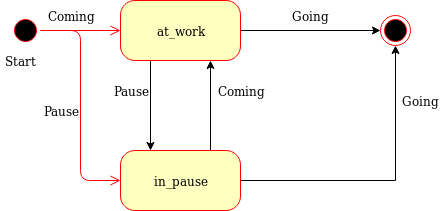Crewtime DSL
Foreword
This is a playground project to have a look at parsing DSLs with Ruby.
The focus was on cleanly separating syntax (the parsing part) from the "business logic" (the interpreter).
Its only purpose is that I learned something :-)
DSL
This project implements a very simple domain specific languages to track worked time from time bookings.
The input is a stream of bookings (Events) for a single day like this:
COMING@2019-12-03T08:30:00
PAUSE@2019-12-03T12:30:00
COMING@2019-12-03T13:00:00
GOING@2019-12-03T18:00:00
The output is a stream of Intervals (here formatted as JSON)
{'type': 'working_time', 'from': '2019-12-03T08:30:00+01:00', 'to': '2019-12-03T12:30:00+01:00' }
{'type': 'pause_time', 'from': '2019-12-03T12:30:00+01:00', 'to': '2019-12-03T13:00:00+01:00' }
{'type': 'working_time', 'from': '2019-12-03T13:00:00+01:00', 'to': '2019-12-03T18:00:00+01:00' }
To make this DSL a bit more interesting it contains some ambiguities. As you can see in the example above the COMING
event can either mean I started my working day or it can mean I came back from my break.
Examples
Here are some examples (the timestamps are ignored, the anchors ^$ are not part of the grammar and just for clarification of the examples):
Valid
^$ -- the simplest day: no booking
^COMING GOING$ -- a simple working day. Semantically this will be interpreted as working_time
^COMING PAUSE COMING GOING$ -- a working day with a pause. Semantically: [working_time, pause_time, working_time]
^COMING PAUSE GOING$ -- Special case: the pause is at the end of the working day and has no COMING booking.
Semantically: [working_time, pause_time]
^COMING PAUSE COMING PAUSE COMING GOING$ -- Two pauses.
Semantically: [working_time, pause_time, working_time, pause_time, working_time]
Invalid
^GOING$ -- no COMING event
^COMING$ -- no GOING event
^GOING COMING$ -- invalid (COMING and GOING in the wrong order)
^COMING GOING COMING GOING$ -- You cannot work "two times" a day
Implementation
The goal of the implementation is to be very clear on the separation of concerns. Because of this the whole process is broken into smaller steps with a clear responsibility.
- Parsing of the text into tokens. The grammar used is as simple, as possible and only detects
COMING@.../GOING@.../PAUSE@.... It does not even validate the correct format of the timestamps. - Transforming of the parse results into
Events. In this step eachEventis syntactically validated (-> timestamp) but nothing more. - Interpretation takes the events and applies the business logic.
A more concise implementation could have merged a lot of 1-3 into a single grammar & transformation, although at the cost of simplicity.
Parsing
Parsing is done via parslet, a ruby library to implement grammars.
Transformation
The transformation into Events is also done via parslet.
The only "business" logic in here is that timestamps are parsed (which prevents dates like the 32nd of June).
Interpretation
The business logic itself is comparably simple and can easily be implemented in a state machine.
The state machine takes care of the following business rules:
- On a given day between
COMINGandGOINGthere is eitherworking_timeorpause_time. - All events must form valid intervals of
working_time/pause_time. Invalid combinations of events must be detected.
In essence, the state machine converts technical Events into something the business can work on. Adding more involved logic such as "On a given day it is not permitted to work more than 10 hours." or "After 9 hours of work the employee is eligible for 45 minutes of pause." can easily be implemented on the list of Intervals.
Installation
Add this line to your application's Gemfile:
gem 'crewtime-parser'And then execute:
$ bundle
Or install it yourself as:
$ gem install crewtime-parser
Usage
just don't use it :-)
Development
After checking out the repo, run bin/setup to install dependencies. Then, run rake test to run the tests. You can also run bin/console for an interactive prompt that will allow you to experiment.
To install this gem onto your local machine, run bundle exec rake install. To release a new version, update the version number in version.rb, and then run bundle exec rake release, which will create a git tag for the version, push git commits and tags, and push the .gem file to rubygems.org.
Contributing
Bug reports and pull requests are welcome on GitHub at https://github.com/[USERNAME]/crewtime-parser.
License
The gem is available as open source under the terms of the MIT License.
